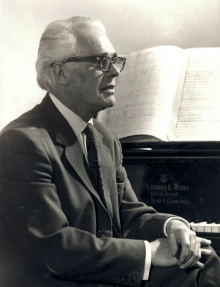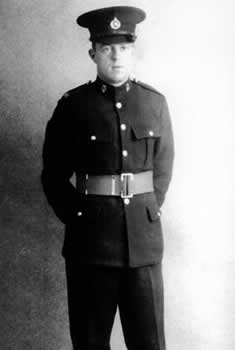CENTENARY OF CEDRIC THORPE DAVIE 1913 – 1983

2013 is the centenary of the birth of Cedric Thorpe Davie who was born in Lewisham, south London
on 30th May 1913 and, after studies at the Scottish National Academy of Music in Glasgow and at the Royal Academy of Music in London, studied composition with Vaughan Williams and Gordon Jacob at the Royal College of Music. He also took some composition lessons from Kodály in Budapest. From 1936 until 1945 he taught theory and composition at the Scottish National Academy of Music and in 1945 moved to St Andrews as the University’s Master of Music. Two years later he founded the Department of Music, and between 1973 and 1978 was Professor of Music.
His one work for wind band will be performed in Scotland on January 17 2014 at the Royal Conservatoire of Scotland 5.30.pm NB TIME
Royal Conservatoire of Scotland Wind Orchestra
Conductors Nigel Boddice & Tim Reynish
Cedric Thorpe Davie – Wee Cooper of Fife
Andrew Duncan - Rhapsodie for Tuba, Piano and Wind Band
Bernard Gilmore - Five Folk Songs for Soprano
Gareth Wood - 3 Mexican Pictures
Nigel, in his article about his recording of the work on a CD entitled Celebrations wrote as follows:
Cedric Thorpe Davie will be known to the brass world for all fifty Variations on a Theme of Lully. In the windband world he is noted for one humorous skit on “The Wee Cooper of Fife (Nickety nackety noo noo noo). It looks harmless, but don’t be fooled for it should carry a government health warning. Written in a busy Fugue and Variation form it is of a 6/8 conception with multiple rhythms and syncopated issues played at high speed. It was originally written for the National Wind Ensemble of Scotland.
In his lifetime, Davie composed more than 200 pieces of music, including scores for films, radio, and theatre. Some of his film works included scores forThe Green Man, a comedy starring Alistair Sim,The Dark Avenger, starring Errol Flynn, and Kidnapped, a Walt Disney film featuring James MacArthur and Peter Finch. His radio credits includedThe King of Nowhere and A House is Built. Davie also worked with Tyrone Guthrie and Robert Kemp to develop theatrical productions, including Ane Satyre of the Thrie Estaites, which opened the second Edinburgh Festival in 1948. In addition to his musical compositions, Davie authored several books, includingMusical Structure and Design and Scotland’s Music. In 1953, he wrote the score for the Walt Disney production Rob Roy: the Highland Rogue. The film, starring Richard Todd (as Rob Roy) and James Robertson Justice premiered in the UK in October with a Royal Command Performance.
CENTENARY GEORGE LLOYD, 1913 - 1998

This year sees the centenary of the birth of George Lloyd, one of the most remarkable composers of the twentieth century. Born at St. Ives 28th June 1913, he died London July 3rd 1998. He showed prodigious talent as a violinist and composer and had composed three symphonies and two operas before the outbreak of World War 2 in which he served in the Royal Marines Band Service. His ship, HMS Trinidad, was holed by one of its own torpedoes, and Lloyd wrote of the incident:
“I am writing this account as I was the last to leave the Transmitting Station and have always kept vivid memories of what took place. There were twenty one men in the transmitting station. Seventeen died. I was stationed close to the ladder, working the switchboard. The ladder was the only way of getting in or out. I was some way up the first ladder when I lost consciousness and remember nothing until I crawled out of the hatch two decks up. Somebody did try after me but the huge hatch cover fell on him and broke his back so I was the last out of the TS.

Traumatised by this horrific incident, Lloyd gradually regained health after the war; in 1951 he virtually abandoned his career in music, and retired to the country, pioneering new modern growing techniques in his market garden. He composed rising at 4.00am, without critical success; his style was totally out of fashion. He wrote: I sent scores off to the BBC. They came back, usually without comment. I never wrote 12-tone music because I didn't like the theory. I studied the blessed thing in the early 1930s and thought it was a cock-eyed idea that produced horrible sounds. It made composers forget how to sing. It was another twenty years before he felt strong enough to tackle the music-making business, but towards the end of his life, his music was taken up by a number of conductors, notably Sir Charles Groves and Edward Downes.
While he composed a number of pieces for brass band which perhaps would transcribe brilliantly for wind, there are two fine works for wind band. A march written for his ship and performed in 1941 at sea is entitled HMS Trinidad March and is available for both wind and brass band from Chester/Novello, published originally by R. Smith and Co. About 5.20 long, it is a splendid concert march, well worth playing especially in this centenary year. You can find it on Youtube, recorded by Black Dyke Mills.
A more substantial work is a ten minute tone poem, The Forest of Arden, which you will find through this link on the website dedicated to the composer. Commissioned by BASBWE in 1987, it is a welcome romantic piece, perhaps the kind of piece that Elgar might have written for us. The New York Times wrote of his music :
Critics were divided about Mr. Lloyd’s music; some found it refreshingly communicative, others considered it old-fashioned. Even his detractors, however, recognized his compositional voice asd authentic and original, not merely a 19th-century pastiche. Although his language is unabashedly tonal, there is a freshness in the melodic writing in the 12 symphonies he composed between 1932 and 1990, and there are engaging complexities in his solo piano works.
New York Times 10th July 1998